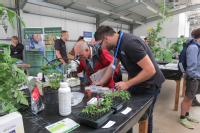Biological Control of Pests and Disease
Biological control is the use by man of a living organism to help manage the population density of a pest organism.
Biological control agents (BCAs) include predatory insects and mites, which eat their prey; parasitoids, which are insects with a free living adult stage and a larval stage that is parasitic on another insect; parasites and microbial pathogens, such as nematodes, fungi, bacteria, viruses and protozoa, which cause lethal infections.
At Warwick Crop Centre we focus mainly on microbial pathogens for the control of pest insects and fungal disease.
Dave Chandler and his colleagues explained the use of biocontrol agents in crop protection at the event, including some examples of biocontrol products. There were also displays from some leading manufacturers and suppliers of biological control agents.
A Technology Strategy Board project with Elsom Seeds is investigating the use of biological control agents to combat seedborne diseases of parsnip and onion and an HDC project where insect biological control agents are being assessed for their ability to control fungal diseases.
As part of the SCEPTRE project (Sustainable Crop and Environment Protection), field trials on the control of pests of field vegetable crops were on view and explained by Rosemary Collier. The aim of the SCEPTRE project is to address the key gaps in crop protection products due to changing EU legislation. SCEPTRE will deliver applied research to help secure label and off-label approvals for new and safer pesticides and biopesticides, and develop sustainable IPM programmes for use on edible crops. SCEPTRE was co-funded by Defra through the HortLINK scheme and is widely supported by industry.



